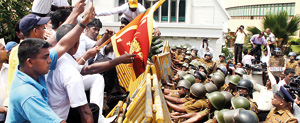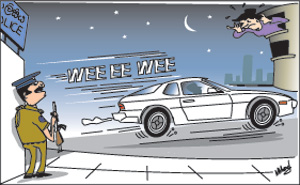Maintaining law and order is a state’s primary responsibility. From its “watch and ward” beginnings, the Police force has evolved as a civilian institution that derives its powers from the law. “Police power” is a misleading concept. The Police Ordinance of 1865 refers only to police duties and responsibilities, not police powers.
Power is a word associated with military might or political authority. Under British colonial rule, the police came to be assigned paramilitary duties, primarily to protect the regime. During the 1915 Sinhala-Muslim riots, the police were utilized, perhaps for the first time in this country, for repressive purposes, under the command of the Trinity College Kandy-Cambridge University alumnus, Inspector General of Police (IGP), Herbert Layard Dowbiggin. There was no military to enforce martial law.
The police were given the “power” to shoot rioters and arrest national leaders. The concept of “police power” in this country may have begun with that historic event.The race riots of 1956 and 1958, the 1971 uprising, the insurgency of the late Eighties, and the emergence of LTTE terrorism hastened the militarisation of our Police Force. Equipped with combat weapons, the Police were called upon to protect vital institutions and vulnerable politicians.
The civilian nature of the Police was further diluted with the formation of a commando-type unit, the Special Task Force (STF) of the Police. Formed in 1982, the brainchild of Ravi Jayewardena, the STF was initially trained by the crack Keenie Meenie Services (KMS), comprising former British Special Air Services (SAS) commandos. The STF turned out to be the most feared combat unit in this country’s war against terrorism.
As terrorism escalated in the Eighties, with suicide attacks and assassinations of politicians, even low-ranking politicians demanded overt as well as covert protection for them and their families. The politicisation of the Police, which began in the Seventies, accelerated as politicians became actively interested in recruitment, promotion, transfers, and so on. Some politicians, with the government’s blessings, saw gold in this situation. A politicised Police Force can easily became partners with corrupt politicians, who may be dealing in narcotics, moonshine, human smuggling, prostitution, abduction and ransom, threats and intimidation. The nexus between corrupt politicians and corrupt police officers is undeniable.
 |
The frightening prospect, as far as democracy is concerned, has been the unlawful and unconscionable use of the Police by successive governments since Independence to suppress peaceful democratic opposition, to harass opponents, including journalists, to hobble the lawful activities of trade unions, and so on. Only a truly courageous and professional Inspector General of Police, a man of integrity who is prepared to risk his job, will resist such moves by the government.
Police excesses, the wrongful use of discretionary powers, and blatantly unconstitutional or illegal acts by the Police, have come to be understood by politicians and the naive public as “police powers.” It is these so-called police powers that our politicians – whether in the North, South, East or West – are vigorously campaigning for.
Edward
Gunawardena,
Battaramulla
Who is to discipline Colombo’s spoilt-brat speed fiends?
High-speed, irresponsible driving has caused horrific accidents and unnecessary deaths in the past few weeks. How do these speed fiends get away with it? They operate freely and openly, day and night, under the very nose of the Police. You find them racing regardless on Havelock Road, Bauddhaloka Mawatha, along the BMICH stretch, and in Cinnamon Gardens.
One speed maniac enjoys racing along Narahenpitiya Road late in the night disturbing the entire neighbourhood. He goes up and down, heading nowhere, in a mighty hurry.
Another race maniac, obviously unemployed, with time and money to show off, hits the roads at all times of day. The earsplitting roar of a speeding vehicle must be music to his ears, but not to the residents and other road users.
These unrestrained speed fiends flaunt their souped-up sports cars, recklessly and irresponsibly weaving in and out of traffic, breaking traffic and environmental laws. I have seen them speed past the Cinnamon Gardens Police Station and along Horton Place and Thimbirigasyaya Road.
Who is to discipline these spoilt new-rich brats? Why is the Police not taking any action? Perhaps everyone is waiting for one almighty horrific accident to occur before action is taken.
M. M. Kamal de Silva,
Colombo 7
Dengue campaign ineffective
Dengue fever causes great pain and suffering and the entire body is affected. Nausea, severe headache, vomiting, high fever, muscle and bone aches, loss of appetite and rash are a few of the symptoms. For a child, dengue can feel like the end of the world. Many children stricken with dengue ask their parents, “Will I die?”
Sri Lanka sent a team of health officials to Cuba to learn dengue eradication methods there. Was it not mandatory in Cuba to get rid of water gutters? Why is this not being done in Sri Lanka?
Karalasingam Sivalingam,
Nugegoda
Daily oil price updates would help
Oil prices are the talk these days. It would be interesting to know how other countries deal with oil prices.
I wish to draw attention to a good practice in Australia. In Melbourne, in the state of Victoria, all petrol stations prominently display the prices of all petroleum products. Vehicle owners often fill their tanks on days when the prices are low. I understand this is a practice throughout Australia.
It would be worthwhile for the authorities here to study this practice. The Australian High Commission, and our own High Commission in Australia, could provide the information.
Instead of a daily adjustment of oil prices, which would lead to complications, we could adjust or revise prices periodically, say, on a monthly or bi-monthly basis. This way, consumers would not be inconvenienced by sudden and drastic oil price hikes.
Oil is an inflammable material. It can inflame an economy and have a negative impact on vulnerable countries. We should keep the public informed of prevailing prices in world markets, if possible, on a daily basis.
H. S. Rajapakse,
Kandy
Still in the dark about electricity pricing methods
In a notice dated January 8, 2012, the Public Utilities Commission of Sri Lanka (PUCSL) said electricity tariffs announced on December 30, 2010 would remain in place until further notice. The notice also said the Ceylon Electricity Board (CEB) and the Lanka Electricity Company Private (LECO) have submitted their revenue requirements for 2012, and there would be a public consultation to discuss the proposed tariff revisions. In a notice dated February 15, 2012, the PUCSL said there would be a Fuel Adjustment Charge (FAC) on monthly bills. It was stated that these notices were issued under Section 30 of the Electricity Act 20 of 2009.
Under the same Section 30 of the Electricity Act 20 of 2009, the PUCSL is expected to set tariffs using a cost-reflective methodology so that licensees can recover all reasonable costs. The PUCSL is also expected to provide subsidies and cross-subsidies financed by the Treasury, and set tariffs and charges that reflected such subsidies.
The PUCSL is also required to set a procedure for the review of licensee tariffs, including a timetable for such a review, and provision for consumers and other interested parties to participate in the review process.
The Electricity Act has been in force for almost three years. The PUCSL Act was passed in 2002, and the Commission has been functioning since 2003, almost nine years.
Despite all the lead time up to 2009, plus another three years, the PUCSL has failed to set cost-reflective tariffs and charges to be levied by licensees reflecting subsidies given or charged to consumers. If this is done, every consumer will be aware of the cost of supply and the subsidy received or charged to finance the subsidy to other consumers. The PUCSL has not informed the public about the subsidies provided by the government. There is no transparency in pricing.
On top of all this vagueness, there is a fuel adjustment charge (FAC) on monthly energy consumption, and that too differs with different consumers and consumption blocks. Domestic consumers who use more than 60 units are charged the highest FAC, at 40 per cent. These percentages appear to have been fixed arbitrarily. Responsible consumers will gladly pay their bills if we know what the real costs are, and the subsidies given.
Will the PUCSL please clarify the following:
- Were the tariffs set in 2010 sufficient for the Ceylon Electricity Board to recover its costs?
- What is the time table for the review of tariffs? Is it every six months or once a year? And what arrangements have been made for members of the public to participate in such a review?
- When will the PUCSL set tariffs reflecting costs and subsidies as required by the statutes quoted?We await the Commission’s early response.
Responsible Consumer
|




